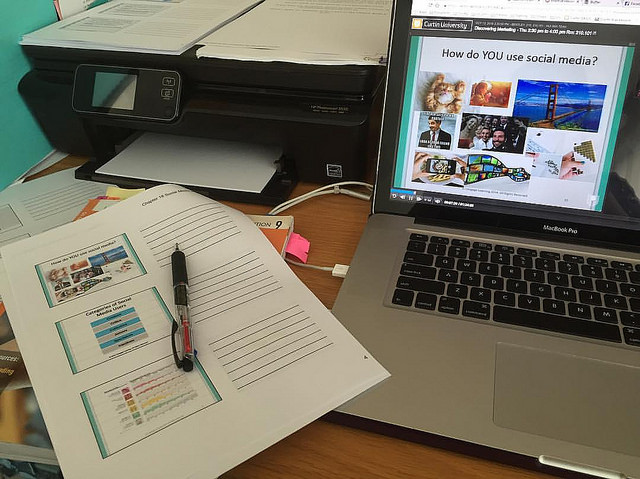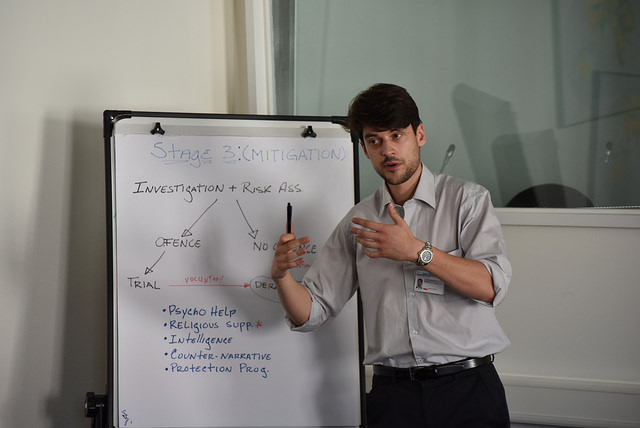Social Media Use Among Academics
Academia relies on the generation, transmission and sharing of knowledge, and there are already many social networks that exist to support such dynamics between academics, and professional researchers. Unsuprisingly social media usage has been growing rapidly amongst academics.
Jordan and Weller (2018) have undertaken an up-to-date and comprehensive review of current findings of views academics have of social media.

Creative commons image from https://www.flickr.com/photos/kitta/30811771492
Previous studies have found that use of platforms such as Twitter have been found to support scholarship and foster cross-disciplinary connections and collaboration between individuals, rather than roles or institutions.
Lupton (2014) found that benefits for academics of using social media included: making connections, developing networks, openness and sharing, research, teaching and support. Problems identified included privacy, the blurring of boundaries, lack of credibility, poor quality of content, time pressures and too much self promotion, plagiarism, and risks to careers. Lupton’s sample focused on social scientists and early career researchers.
Jordan and Weller (2018) analysed results for a larger and diverse sample of academics, including a majority who were natural scientists.
Overall it was found that a greater proportion of academics (72% of a sample) described problems rather than benefits (39%), with 11% describing both benefits and problems from online networking.
Key benefits were identified as research dissemination, opening up conversations about research with different audiences – which also allowed users to gain instant feedback on ideas, stay up-to-date and find potential collaborators. This type of network was seen to be particularly useful to early career academics. The facility to host multiple profiles was also viewed as important.
Major problems were identified as: time pressures. These were related concerns about spam, privacy, security, and intrusiveness. Generally there was concern over the relationship between commercialism and academia.
Many users also felt that social networks weren’t useful to them in terms of professional networking, and preferred other forms of networking e.g through conferences.
Quotes from academics included:
“excessive communication by email etc from the network represents an invasion of your time, access to network should be voluntary”.
“I believe in most cases social networking can be used as a tool to invade personal privacy and that the information can be abused by unintended recipients.”
“The problem with most social networking sites is that none of them care about the goals of the people that they purposedly serve. These site have secondary goals of punishing us with marketing and ads.”
Other concerns included not knowing how to use sites (digital literacy or design issues) and digital inclusion (due to the use of English language only).

Creative commons image from https://www.flickr.com/photos/gcmcphotos/19887146935
Conclusion
Jordan and Weller (2018) complete their review by stating that many academics feel obliged to use social media, but like many others in society they are increasingly focused on the risks that they face as individuals.
It is also important to recognise that usage of, and outcomes on social media can vary dependent on the academic discipline (Thelwal and Kousha 2013, Ortega 2015, and Megwalu 2015), type of academic, the stage in their academic career, and personal characteristics including gender, and country of origin.
By Nina Schuller
References
Jordan, K and Weller, M 2018 Academics and Social Networking Sites: Benefits, Problems and Tensions in Professional Engagement with Online Networking. Journal of Interactive Media in Education, 2018(1): 1, pp. 1–9, DOI: https://doi.org/10.5334/jime.448
Lupton, D (2014) ‘Feeling better connected’: Academics’ use of social media. News & Media Research Centre, University of Canberra. Available from https://www.canberra.edu.au/about-uc/faculties/arts-design/attachments2/pdf/n-and-mrc/Feeling-Better-Connected-report-final.pdf (Accessed on the 17 March 2018).
Megwalu, A (2015) ‘Academic Social Networking: A Case Study on Users’ Information Behavior’, in Woodsworth, A and, W. Penniman, W D (ed.) Current Issues in Libraries, Information Science and Related Fields. Advances in Librarianship, 39. Emerald Group Publishing Limited, pp. 185 – 214.
Ortega, J, L (2015) “Disciplinary differences in the use of academic social networking sites”, Online Information Review, 39 (4), pp.520-536, https://doi.org/10.1108/OIR-03-2015-0093
Thelwall, M and Kousha, K (2013) ‘Academia.edu: Social network or Academic Network?’ Journal of the Association for Information Science and Technology 65 (4), pp 721–731, https://doi.org/10.1002/asi.23038
